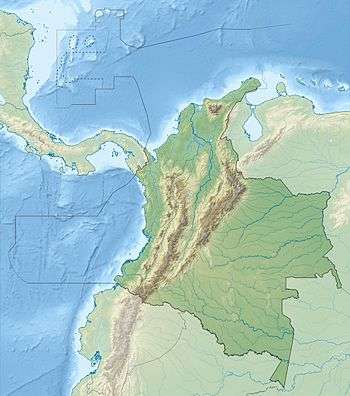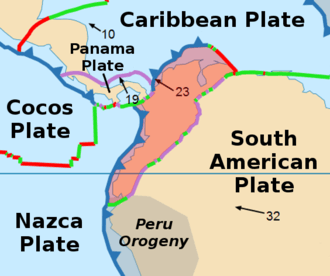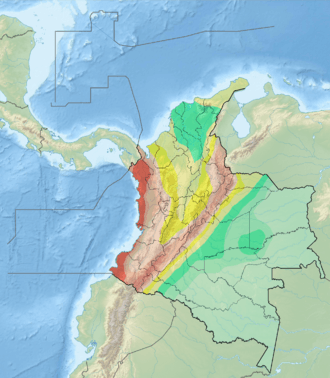1970 Colombia earthquake
 | |
| UTC time | 1970-07-31 17:08:05 |
|---|---|
| ISC event | 794176 |
| USGS-ANSS | ComCat |
| Local date | July 31, 1970 |
| Local time | 12:08:05 |
| Magnitude | 8.0 Mw [1] |
| Depth | 645 km (401 mi) [1] |
| Epicenter | 1°36′S 72°32′W / 1.6°S 72.53°WCoordinates: 1°36′S 72°32′W / 1.6°S 72.53°W [1] |
| Areas affected | Colombia |
| Casualties | 1 dead, several injured [2] |
The 1970 Colombia earthquake occurred in Colombia on July 31.
Details and aftermath
The shock killed one person and injured several others. Because it was a deep-focus earthquake, shaking occurred over an extensive area, including San Juan, Bogotá, Caracas, Buenos Aires, and São Paulo; it was felt as far north as Mexico City.[3] Its depth forestalled more serious casualties,[3] and there were no aftershocks.[4]
The depth of the earthquake prompted scientists in South America to install seismometer networks focused on long-period earthquakes.[3] Until the 1994 Bolivia earthquake, the 1970 Colombia earthquake was famous among seismologists as the largest deep earthquake.[5]
Analysis
A study completed by Dziewonski and Gilbert (1974) determined that the earthquake had featured isotropic compression, or an increase in density near the rupture point similar to an implosion;[6] this was released to great controversy.[5] They also claimed that the compression had been initiated 80 seconds before the actual earthquake's short-period shaking. Many studies have reached differing conclusions including a dearth of isotropic movement, and many scientists feel that resolution created errors in Dziewonski and Gilbert's findings.[7] In 1997, Russakoff, Ekstrom, and Tromp reassessed their findings utilizing more advanced equipment that factored in shear wave splitting and coupling (the measure of how tightly locked two sides of a fault or plate are) and confirmed that there was very little isotropic compression.[5]
See also
References
- 1 2 3 ISC (2015), ISC-GEM Global Instrumental Earthquake Catalogue (1900–2009), Version 2.0, International Seismological Centre
- ↑ IISEE. "IISEE Catalogue Search parameters page". Catalog of Damaging Earthquakes in the World. Retrieved August 18, 2013.
- 1 2 3 "Historic Earthquakes: Colombia 1970". United States Geological Survey. November 1, 2012. Retrieved July 30, 2013.
- ↑ Karato, Shun'ichiro (2003). The Dynamic Structure of the Deep Earth: An Interdisciplinary Approach. Princeton University Press. p. 162. ISBN 978-0691095110.
- 1 2 3 Russakoff, Ekstrom, and Tromp, pg. 20423.
- ↑ Kennett, L.N.; Simons, R.S. (1976). "An Implosive Precursor to the Colombia Earthquake 1970 July 31". Geophysical Journal International. 44 (2): 471. Bibcode:1976GeoJI..44..471K. doi:10.1111/j.1365-246X.1976.tb03668.x.
- ↑ Russakoff, Ekstrom, and Tromp, pg. 20424.
Bibliography
- Russakoff, Daniel; Ekström, Göran & Tromp, Jeroen (September 10, 1997). "A new analysis of the great 1970 Colombia earthquake and its isotropic component". Journal of Geophysical Research. 102 (B9): 20, 423–20, 434. Bibcode:1997JGR...10220423R. doi:10.1029/97jb01645.
External links
- The International Seismological Centre has a bibliography and/or authoritative data for this event.

